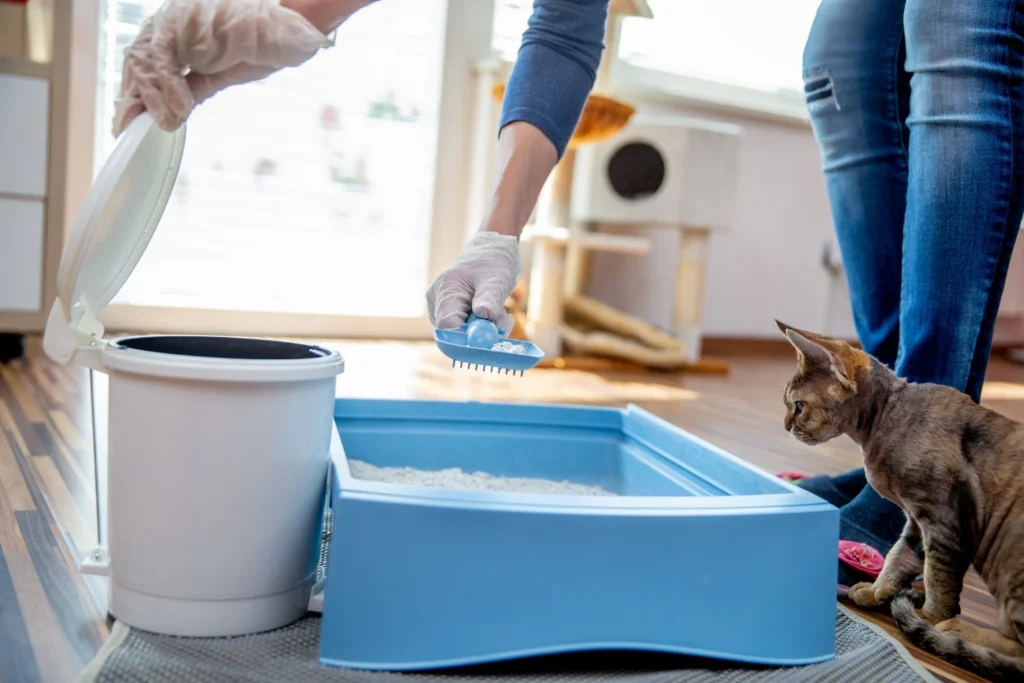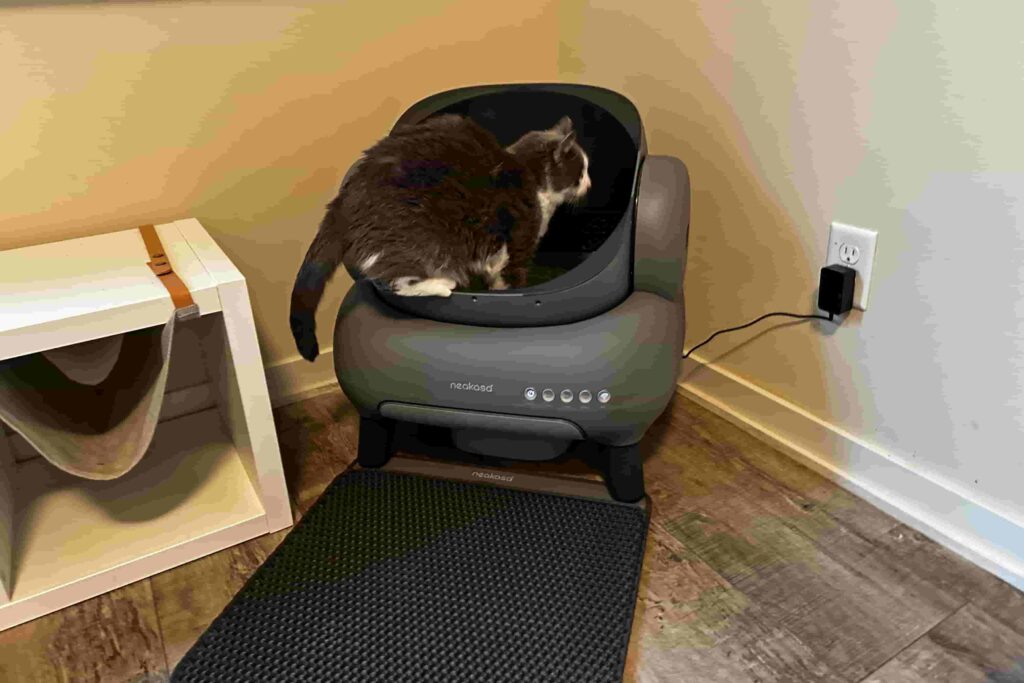To get rid of cat poop smell, clean the litter box daily, use quality clumping litter, deep clean weekly, improve ventilation, and ensure your cat’s health and diet are well managed.
Cat owners know how lovable and entertaining their furry friends can be. But there’s one not-so-pleasant aspect of cat ownership: the lingering smell of cat poop. Whether you live in a small apartment or a spacious home, the strong odor from your cat’s litter box can be overwhelming if not managed properly.
The good news? With the right techniques, tools, and habits, you can eliminate cat poop smell effectively and keep your home smelling clean and fresh. In this guide, we’ll walk you through practical tips to remove cat odor, prevent it from coming back, and keep your cat happy and your house odor-free.
Why Does Cat Poop Smell So Bad?
Before tackling the smell, it helps to understand why cat poop has such a strong odor. Cats are carnivores, and their diets are high in protein. This leads to strong-smelling waste. Additionally, some cats may have digestive issues or eat certain types of food that make the smell worse.
Other contributing factors include:
- Poor litter box maintenance
- Unsuitable litter type
- Inadequate ventilation
- Health issues like parasites or infections
Scoop the Litter Box Daily (Or More)

The most effective way to reduce cat poop smell is to clean the litter box at least once a day. Leaving waste in the box allows the odor to build up and spread throughout the room.
Tips:
- Scoop out clumps and poop every day.
- Use a litter scoop with fine holes for better results.
- Dispose of waste in a sealed trash bag to prevent further odor.
Use High-Quality Clumping Litter
Not all litter is created equal. If you’re using low-quality litter, it might not absorb smells well.
Choose a litter that:
- Clumps tightly (making waste removal easier)
- Has odor-neutralizing ingredients (like baking soda or charcoal)
- Is unscented or lightly scented (heavy scents can irritate both you and your cat)
Popular options include:
- Clay-based clumping litter
- Crystal or silica gel litter
- Natural litter (corn, wheat, pine)
Deep Clean the Litter Box Weekly
Even with regular scooping, bacteria can build up on the litter box itself. A weekly deep clean helps prevent lingering smells.
How to clean the litter box:
- Empty all litter from the box.
- Wash with warm water and mild soap.
- Avoid strong-smelling cleaners (like bleach or ammonia) as cats dislike the smell.
- Let it dry completely before refilling with fresh litter.
For plastic boxes, consider replacing them every 6–12 months. Over time, plastic can absorb odors.
Use Litter Box Deodorizers
Litter box deodorizers can neutralize smells without bothering your cat.
Effective options:
- Baking soda (sprinkle a little at the bottom of the box)
- Activated charcoal filters (found in some litter box covers)
- Commercial deodorizers (make sure they’re pet-safe)
Avoid using essential oils unless you’re certain they’re safe for cats—many can be toxic.
Add More Litter Boxes
If you have multiple cats or a large home, you need more than one litter box. The general rule is:
1 litter box per cat + 1 extra
Having multiple boxes:
- Prevents overcrowding
- Reduces the chance of accidents
- Helps control odor by spreading out waste
Improve Air Circulation
Good airflow can help carry odors away instead of trapping them inside.
What you can do:
- Open windows regularly
- Use a fan or air purifier near the litter box
- Avoid placing the box in enclosed areas like closets or cabinets
An air purifier with a HEPA filter and carbon filter works great for removing pet odors from the air.
Watch Your Cat’s Diet
Diet plays a big role in the smell of your cat’s poop. Low-quality cat food can cause smelly stools, while a better-quality diet may reduce the odor.
Tips:
- Choose high-protein, low-filler cat food
- Avoid foods with excessive artificial ingredients
- Consult your vet if you notice very foul-smelling or loose stools
Also, ensure your cat drinks enough water—hydration improves digestion and reduces smell.
Check for Health Issues
If you’re doing everything right and your cat’s poop still smells awful, it might be time to visit the vet.
Health issues that can cause strong odors include:
- Parasites
- Infections
- Food intolerances
- Inflammatory bowel disease (IBD)
Your vet can help diagnose and treat any underlying conditions.
Consider Covered or Self-Cleaning Litter Boxes

Covered litter boxes can trap some of the odor inside, while self-cleaning litter boxes remove waste automatically after each use.
Pros of covered boxes:
- Keeps the smell more contained
- Provides privacy for cats
Pros of self-cleaning boxes:
- Minimal maintenance
- Less frequent scooping
- Less chance for smell to spread
However, not all cats like covered or automatic boxes—observe your cat’s behavior before switching.
Use Enzyme Cleaners for Accidents
If your cat goes outside the box, clean the area immediately with an enzyme cleaner. These cleaners break down the organic matter and eliminate odors at the source, unlike regular cleaners that only mask the smell.
FAQs:
1. How often should I scoop my cat’s litter box?
Scoop the litter box at least once daily to prevent odor build-up and keep your home smelling fresh. Multiple cats may require more frequent scooping.
2. What type of litter controls odor best?
High-quality clumping litter with odor-neutralizing agents like baking soda or charcoal works best. Choose unscented or lightly scented types to avoid irritating your cat’s senses.
3. Can a poor diet cause smelly cat poop?
Yes, low-quality food with fillers can worsen stool odor. A high-protein, well-balanced diet and proper hydration help reduce the smell of your cat’s waste.
4. Do air purifiers help eliminate cat poop smell?
Yes, air purifiers with HEPA and carbon filters improve air quality by removing pet-related odors, including litter box smells, especially in small or enclosed living spaces.
5. When should I see a vet about smelly poop?
If your cat’s poop consistently smells unusually bad despite good hygiene and diet, visit a vet. Possible causes include infections, parasites, or digestive disorders like IBD.
Conclusion:
Managing cat poop smell is simple with the right routine and tools. Daily scooping, choosing the right litter, improving airflow, and addressing diet and health issues are key steps. Keep litter boxes clean, monitor your cat’s habits, and consider odor-neutralizing solutions like deodorizers or air purifiers. With consistent care, you’ll enjoy a fresher, cleaner home while keeping your cat comfortable and content every day.
Related Post:
- Low Carb Canned Cat Food – Guide to Feline Health Nutrition!
- What Scents Are Safe For Cats – Complete Guide!
- Do House Cats Need To Be Vaccinated – Explained Guide!
